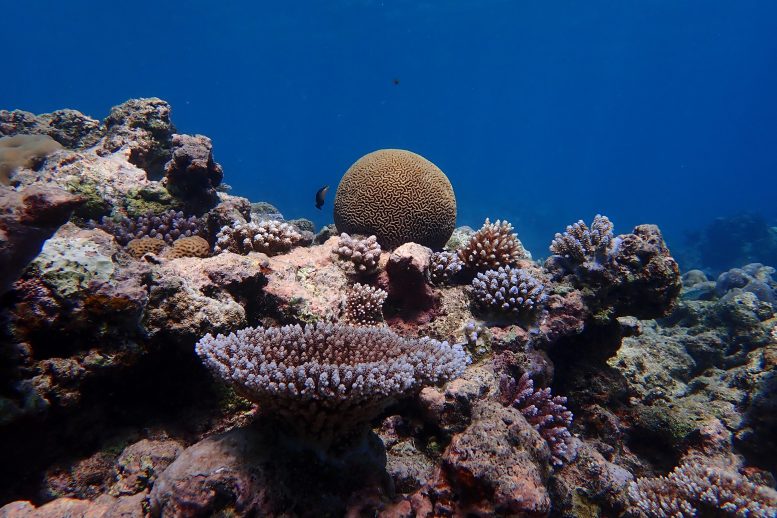
Coral reefs in Palau, Pacific Ocean, are showing increased thermal tolerance, potentially reducing future climate change-induced bleaching. However, the study emphasizes the urgent need for global carbon emissions reduction and adherence to the Paris Agreement to protect these vital ecosystems.
Coral reefs in one part of the Pacific Ocean appear to have adapted to higher ocean temperatures, potentially reducing the future bleaching impacts of climate change, new research reveals.
Focused on the Pacific Island nation of Palau, a study led by Newcastle University has shown that historic increases in the thermal tolerance of coral reefs are possible. The results demonstrate how this capacity could reduce future bleaching impacts if global carbon emissions are cut down.
Drawing on decades of field observations, the scientists modeled many possible future coral bleaching trajectories for Palauan reefs, each with a different simulated rate of thermal tolerance enhancement. They found that if coral thermal tolerance continues to rise throughout the 21st century at the most-likely historic rate, significant reductions in bleaching impacts are possible.
Published Findings and Implications
Published today (August 22) in the journal Nature Communications, the results affirm the scientific consensus that the severity of future coral bleaching depends on carbon emissions reductions. High-frequency bleaching can be fully mitigated at some reefs under low-to-middle emissions scenarios where, for example, the Paris Agreement commitments are fulfilled. However, such bleaching impacts are unavoidable under high emissions scenarios where society continues to rely on fossil-fuelled development.

Study lead author, Liam Lachs, is part of Newcastle University’s Coralassist lab. “Our study indicates the presence of an ecological resilience to climate change, yet also highlights the need to fulfill Paris Agreement commitments to effectively preserve coral reefs,” Lachs said. “We quantified a natural increase in coral thermal tolerance over decadal time scales which can be directly compared to the rate of ocean warming. While our work offers a glimmer of hope, it also emphasizes the need for continued action on reducing carbon emissions to mitigate climate change and secure a future for these vital ecosystems.”
Study co-author, Dr. James Guest, of Newcastle University’s School of Natural and Environmental Sciences, added: “We know that coral reefs can increase their overall thermal tolerance over time by acclimatization, genetic adaptation or shifts in community structure, however, we know very little about the rates at which this is occurring. This study uses data from a remote Pacific coral reef system and estimates the rate of increase in tolerance since the late 1980s. The results provide some hope that reefs can keep up with increasing temperatures, but only if strong action is taken on climate change.”
Collaborative Research and Broader Perspective
This study was the result of a collaborative visit the lead author undertook in 2021 to work with Professor Simon Donner’s Climate and Coastal Ecosystems Laboratory at the University of British Columbia, Canada.
“This study shows the potential for some coral reefs to become more resilient to future climate change-fuelled heat waves,” Prof. Donner said. “That resilience, however, can also come at a cost, in terms of reduced reef diversity and growth. Without sharp cuts in greenhouse gas emissions over the next two to three decades, the reefs in the Pacific won’t provide the resources and protection from waves that Pacific peoples have depended upon for centuries.”
Future of Coral Reefs
Coral reefs harbor remarkable levels of biodiversity, yet also face unprecedented declines due to marine heatwaves and resulting mass coral bleaching and mortality events. To persist under climate change, coral communities need to endure progressively more intense and frequent marine heat waves.
The rate at which the thermal tolerance of coral reefs can increase naturally and whether this can match the pace of ocean warming has remained largely unknown. To fill this knowledge gap and offer insights into the future resilience of coral communities, the team from Newcastle University investigated historic mass bleaching events, with a focus on the case study of Palau, a remote Pacific coral reef system.
The study also tested different levels of global action to mitigate climate change and reduce carbon emissions, investigating four emissions scenarios and their impact on future coral bleaching projections.
According to the findings, the thermal tolerance of corals in Palau has likely increased at a rate of 0.1 °C per decade since the late 1980s. This increase suggests that natural mechanisms, such as genetic adaptation or acclimatization of corals or their symbiotic microalgae, could have contributed to the enhancement of coral thermal tolerance.
Study co-author Prof. Peter Mumby of the University of Queensland and Palau International Coral Reef Center reflects that “some of the upcoming challenges will be to disentangle which mechanisms have driven these potential shifts in tolerance, and to understand the possibility of continued future increases in thermal tolerance.”
Reference: “Emergent increase in coral thermal tolerance reduces mass bleaching under climate change” by Liam Lachs, Simon Donner, Peter J. Mumby, John C. Bythell, Adriana Humanes, Holly K. East and James R. Guest, 22 August 2023, Nature Communications.
DOI: 10.1038/s41467-023-40601-6
1 Comment
My first thought is that the coral reefs in the Florida Keys which have all but vanished have been exposed to severe water quality issues for decades and are not able to adapt like those in the Pacific. South Cuban coral reefs as well as those in the Bahamas are subject to cleaner water. They should be of interest to monitor during this climate crisis. When polluted water is warmed it becomes like a lethal toxic soup.